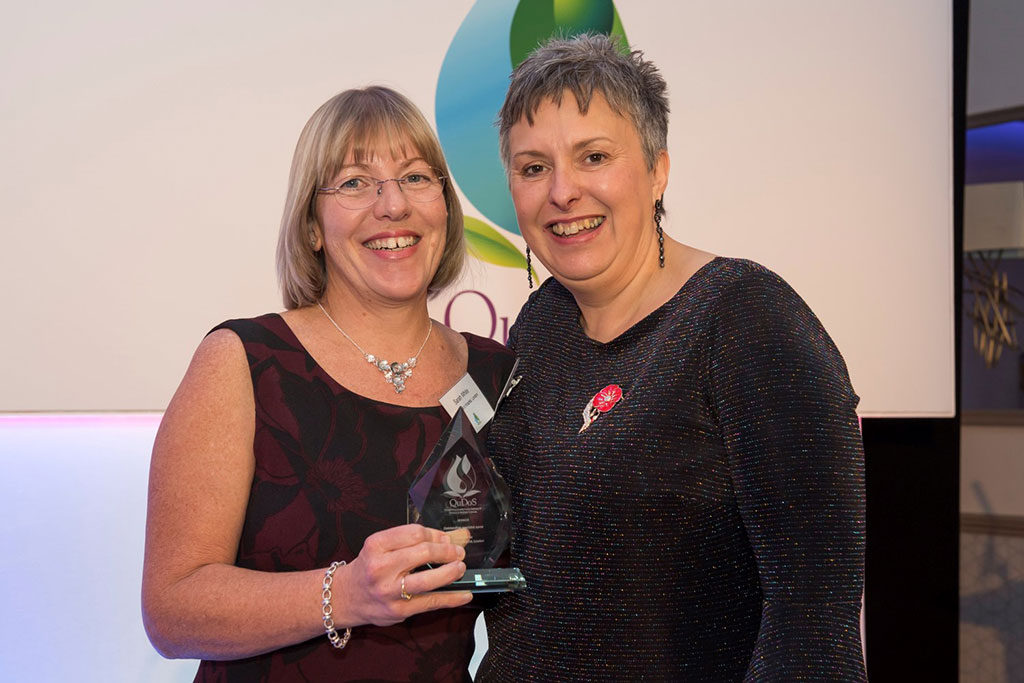
(From left to right: Sarah White with Karen Vernon, MS nurse consultant at the Salford Royal NHS Foundation Trust and 2017 judge)
“It’s a great honour and I am so happy to be here. Nurses are doing great things in the face of challenging circumstances. I could not do my job without the team I work with. I love watching them develop and seeing them grow: that’s what gives me the buzz.”
Sarah White, MS specialist nurse, St George’s Hospital, London
This year’s QuDoS recognition programme, organised by pharmaphorum and the Multiple Sclerosis Trust, highlighted best practice in care for the disease. As part of a series of articles profiling the winners, pharmaphorum speaks to Sarah White, winner of the Outstanding MS Specialist Nurse category.
Q: What has been your main contribution to your team?
A: When I first started in 2003 there was only a small MS service. There were two neurologists and a nurse offering a DMT service. Over the last 14 years I contributed to building the team up to include MS specialist nurses, MS therapy nurses, a team coordinator and a phlebotomist.
Q: What is the team’s caseload, and could you also describe the area that the team covers?
A: There are four MS nurses which is equivalent to 3.5 full time roles. There are two full time MS therapy nurses running the infusion service and virtual monitoring clinic, a team coordinator, and we are about to employ an MS phlebotomist. We also work with a large team of neurologists. We have a caseload of 1,200 active patients – but compared with some teams we do have a sustainable caseload. We provide a local MS nursing service to several London boroughs as well as a regional service to patients on higher efficacy DMTs.
Q: What initiatives did you bring to the team?
A: The most recent one is the DMT virtual monitoring clinic. The virtual clinic allows patients to be monitored safely without the need to see a nurse each time. The clinic is overseen by an MS team coordinator and MS therapy nurse. The patient has the flexibility to attend one of three sites at any time during the day of their appointment, and the system ensures the team knows if they have not attended. An MS therapy nurse reviews the blood and urine test results. If the results are within set parameters no further action is taken. If the results are outside the set parameters, we allocate time to discuss this with a consultant neurologist on the same day. We then notify patients and their GPs about abnormal results. The clinic admin team then send the patients the next appointment date. People are unable to reschedule their appointment other than through the MS team, ensuring that no-one is lost to follow up. Patients still get regular face-to-face reviews with a nurse at set time points but not each time blood tests are due, thus freeing up space in the MS nurse clinics to ensure patients not on DMT can still be seen.
Another development is the DMT Group Information Clinic. As the team’s caseload grew it became unsustainable to see each patient individually to provide comprehensive information on first line DMTs. I discussed with other centres how they had overcome this and set up the group clinic which runs twice a month. Patients choosing between various first line treatments come to a group discussion, which enables the team to see patients quickly and the patients really like it too as they can discuss what they think with each other.
Q: What did it mean to win the Outstanding MS specialist nurse award?
A: It was a great honour to win it. It was lovely having the recognition from the neurologist who nominated me. There are lots of nurses out there doing great jobs. It was really good to see what other people are doing as well. To be quite honest I was really shocked that it was me, but it’s a great honour. It’s lovely.
Q: What plans have you got for the future, in terms of your career and in terms of the team?
A: I intend to stay where I am, and one of the things I would like to look at is how we address the comprehensive annual review. Everyone gets one – we want to make sure it is comprehensive in terms of meeting the NICE Quality Standards. I am also looking forward to nurturing and developing the younger members of the team so that they can take over when I retire in the long term.
Q: What’s the importance of initiatives like this to recognise work that’s going on?
A: I think it’s really important because often we get so bogged down in the day job and just getting on with our jobs that we don’t have a chance to see what other centres are doing and some of the innovative practice that has been highlighted tonight. It’s great to come to events like this.
Q: And you’re clearly very passionate about what you do. What’s the satisfaction you get day to day?
A: I think there are two things. I think probably in the role I’m in now, the satisfaction is actually seeing some of the junior members of the team really learning and developing and becoming great nurses, very skilled nurses, so I love that part of my role. And then the other bit would be just delivering the patient care. I just love being a nurse and I just love what I do. Just being able to be there alongside the patient is what makes me tick.